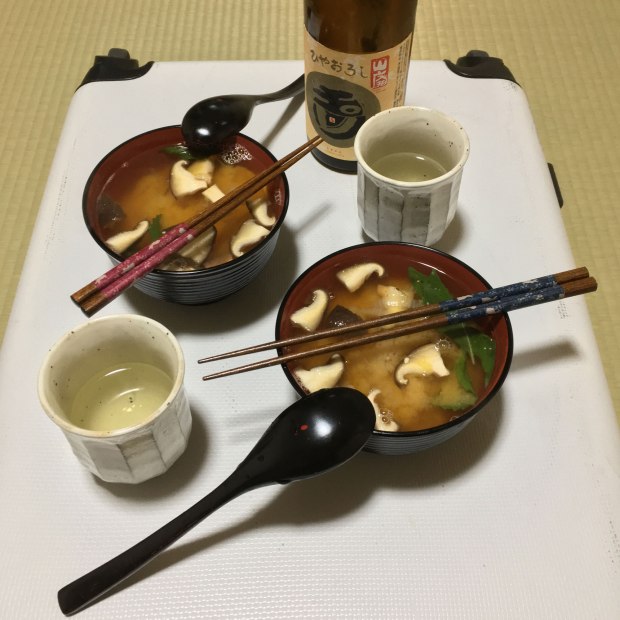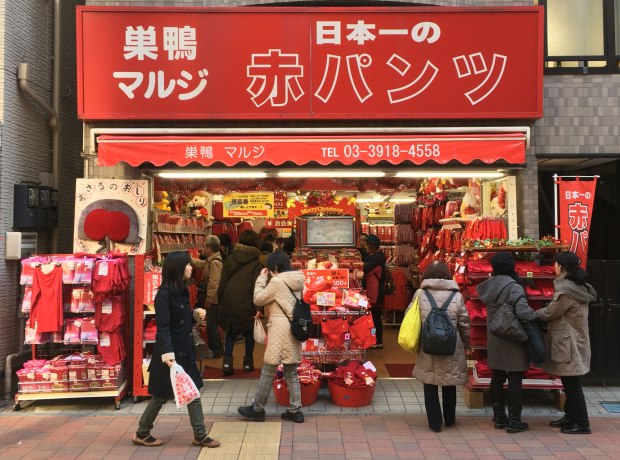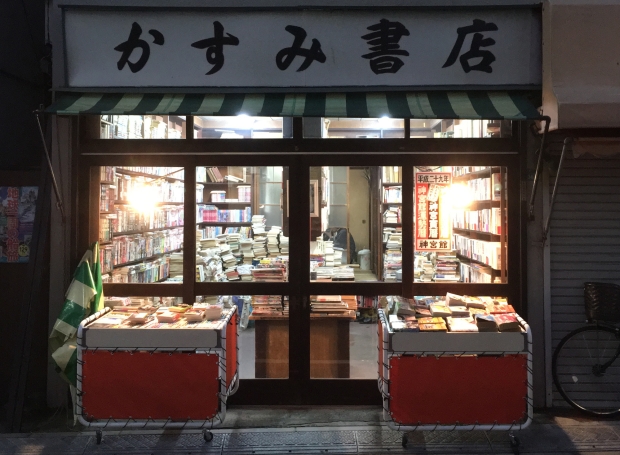Well, after about five years of my wife making noises about wanting to move back to Japan, after about one year of wondering how and when we would do it and where we would live, after three months of waiting for an impressive amount of books, pots and pans, wine and spirits, tea and honey (oh, and some clothes, too) to arrive, and then another two weeks to take them all out of the 150 cardboard boxes they came in, tidy them away, and start using them again, we can finally call our little flat in Tokyo home.

Dinner before our furniture arrived: miso soup (Kanesa naturally farmed soy bean miso, organic vegetables from Chiba and yuzu from Shikoku) and Tamagawa yamahai junmai sake from Kyoto prefecture, all balanced on tip of a suitcase
Tokyo is an amazing place, and it’s great to be here: it’s not just big, it’s incredibly dense, and not so much in the way you expect big cities to be (i.e. jam-packed with people), as in the sense that you can find anything and everything here: there is at least one shop, one person, one family sometimes even, devoted to each and every specialisation possibly imaginable, and every street, every corner, every multi-storey building hides any number of individual paradises for geeks and experts-in-the-making. In one of my many walks around town getting to know the place I came a cross a trowel shop: that’s right, an entire shop devoted to nothing but trowels of all different (but very nearly identical – the devil is in the details, after all) shapes and sizes, all distinguishable one from the other and yet all intended to perform the same basic function of applying plaster to a wall. On another walk, still not far from where we live, I found a shop whose sole raison-d’être was red underwear!

赤いパンツ Akai Pantsu: the red underwear specialist in Sugamo
In fact, it sometimes seems as though Japan and the Japanese have consciously devoted themselves to the arts of accumulation, organisation and classification. Trowels and red underwear may be rather extreme examples, however: a better example might be book shops.

An old-fashioned bookshop in the Sugamo area of Tokyo
Tokyo bookshops are quite simply amazing. They range from the old-fashioned, small and foosty ones invariably attached to the front of someone’s private house (in the photo above, you can see the guardian of the bookshop in the backroom watching television and slurping his noodles), through the omni-present and ultra-efficient second-hand Book Off stores, to the multi-storey, flashy and ultra-modern behemoths that are Maruzen and Kinokuniya, but they all share a number of irreproachable qualities: they are incredibly well-stocked, well-organised, well-informed and very efficient. When you have esoteric tastes like me, it is often hard to locate second-hand versions of the books you want, and harder still to get hold of them. In Tokyo, however, I have already come across a number of the books (on Natural Agriculture, permaculture, vegetables etc.) that I was expecting to have to buy new. The ones I haven’t found just by entering bookshops as I came across them, I have found by searching for them on their online databases. Some of these books I will be reviewing on this blog.
All of that being said, not everything in Japan is as simple as books: being able to find anything and everything you could possibly wish for is one thing, being able to afford it is another. Having lived for the best part of ten years in Paris, my wife and I had developed expensive (we didn’t know it at the time) tastes for what we could reliably find in Paris, but less so in Tokyo: 1000 yen here for the butter we bought in Paris for a fifth of the price, 900 yen for a litre of organic milk, 3000 yen for a 300ml pot of organic Japanese honey, 3000, 4000 or 5000 yen for the bottle of natural wine we bought for fifteen euros… So we were very happy to be reunited with many of our treasured belongings from Paris, the things we’ve been consciously seeking out and buying up in preparation for our move: pressure cookers, frying pans, literally kilos and kilos of organic French honey, dozens and dozens of varieties of both sheng and shu vintage Pu Erh, oolong, red and white teas from when I did some work with a famous French-Taiwanese tea house, a few cases of natural French wine, farming tools (the scary-looking, sharp ones I was worried the customs might not like the look of) and, perhaps best of all, my library and the computer I am writing this on.
With all of our belongings finally on the right side of the Asian continent, I was at last free to get on with working out how to do what I had come here to do: become a farmer. And so the tale begins…
